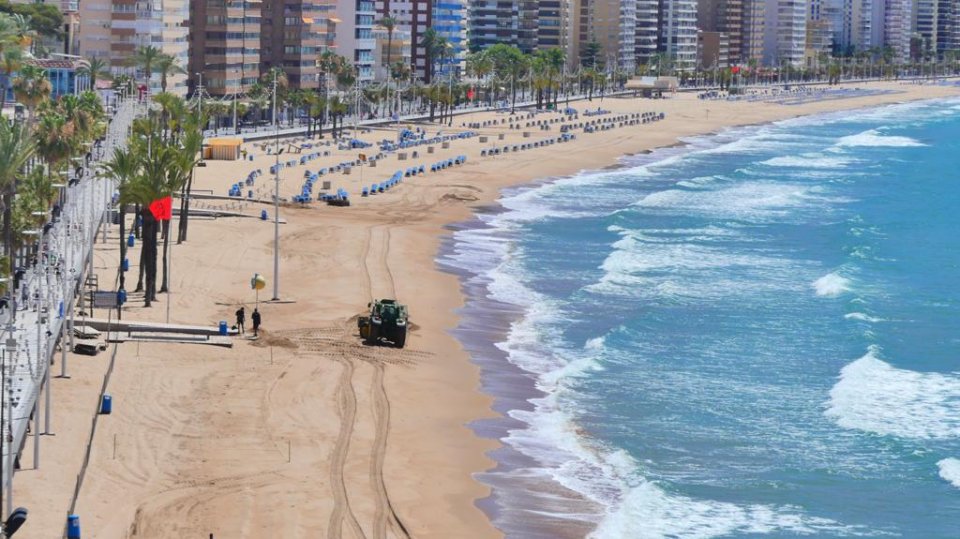Benidorm by appointment
On the day the Valencia region goes into Phase Three of de-escalation plans (from Monday 15 June), Benidorm re-opens its famous beaches, which will eventually be by appointment only and with certain areas exclusively for the over 70s, under the new ‘Benidorm Beach Safety’ plan.
By the time international visitors start arriving (from within the Schengen area from 21 June and from outside after 1 July), plots will be booked online, via a website or app, as soon as the system is up and running. Spain announced on Sunday that visitors from EU states in the Schengen area can visit from 21 June.
ALSO READ: Spain open to EU visitors from 21 June (except Portugal), quarantine also lifted
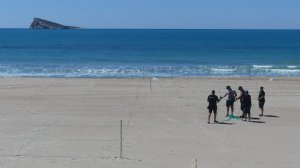
For those who can’t access the internet there will also be six information points where reservations can also be made.
The beaches open on Monday, however – earlier than they had previously announced – and the two main beaches, Levante and Poniente, will be divided into 20 sectors.
Twelve of the sectors will be open to all ages and be made up of 5,122 plots of 16m2. Each plot is for a maximum of four people. Within the 12 sectors some will be red, exclusively for the over 70s, and some will be blue for all other age groups, although over 70s can voluntarily join groups in blue areas if they choose.
The remaining eight sectors will be furnished with 5,578 sun loungers (875 fewer than a normal summer) and the maximum occupancy of the beaches this year will be 26,066 people, around half the normal number.
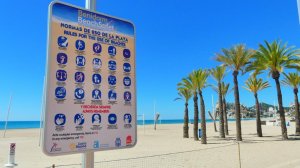
There will be 20 beach access points which will be controlled by beach attendants.
The beach plot system starts on Monday 15 June with attendants helping the beachgoers.
The beaches will open between 9am-9pm, although the original plan of morning and afternoon slots could still become a reality if demand becomes too high during peak season.
Covid-19 battle
The battle against Covid-19 continues, although the results from the Valencia region appear to be going in the right direction. On Saturday, for instance, the region reported just four new cases of Coronavirus infections. There were sadly two deaths but also 106 ‘all clears’ from the previous 24 hours.
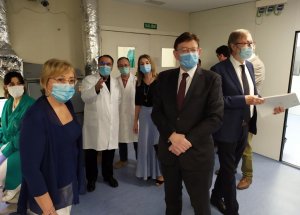
Valencian President, Ximo Puig, along with health councillor, Ana Barceló, visited the laboratories of the Valencian foundation FISABIO (Fundación para el Fomento de la Investigación Sanitaria y Biomédica), where they are working on an international project to develop a new two-minute test for Coronavirus. Not only will the test give a rapid result, it will also come in at under €1.
Puig tweeted: ‘If we don’t give our support to science now, when?’
Airports
It’s been a mixed week for the airline industry.
On Monday Jet2 postponed the re-starting of their operations. The company which flies into Alicante-Elche announced on its website that due to the on-going uncertainty caused by the Coronavirus pandemic, they have decided to recommence their flights and holidays programme on 15 July.
Anyone travelling before that date will be affected and the airline said, ‘We’re proactively contacting all affected customers in departure date order.’
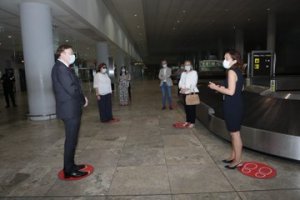
Meanwhile during a visit to Alicante-Elche airport on Tuesday, Ximo Puig said that the Valencian region was prepared for the holiday season and the arrival of international visitors from 1 July, ‘with all the guarantees of a safe destination and with the ability to compete.’
On his first trip to Alicante since the ‘state of alarm’ was announced in March, Puig stressed that the holiday season ‘is not lost’.
He said that the Valencian region had acted with ‘prudence’ and that there had been a high level of control of the pandemic, which meant the region could offer safe holidays which its citizens deserved.
However, one thing is certain, Alicante airport will not be receiving the 15m passengers that it did in 2019.
Waving flags
This week beaches in Spain were allocated their Blue Flag status, or not. In total 148 beaches along the coast of the Valencian region received the recognition, the highest number of any Spanish region. Alicante province received 73 blue flags, more than Castellón and Valencia provinces combined.
The Blue Flag is one of the world’s most recognised voluntary eco-labels that is awarded to beaches, marinas, and sustainable boating tourism operators. In order to qualify for the Blue Flag, a series of stringent environmental, educational, safety and accessibility criteria must be met and maintained.
Spain has received 688 Blue Flags in total this year and continues to be the international leader, a position which it has held without interruption since 1987.
Beach helpers
Last week we reported that 1,000 beach helpers would be recruited to aid visitors, lifeguards and police in organising crowds on Valencia’s beaches.
The job-offer, for 18-30 year-olds with a driving licence and the ESO secondary education qualification, was posted online on Wednesday giving hopefuls just two days to apply.
By the time it closed on Friday more than 22,300 people had applied for the jobs which will begin on 24 June and end on 7 September, with a total earning of €4,037 gross.
Skin cancer warning
As the good weather persists and we continue our journey out of lockdown, the health department is warning us to take extra care against skin cancer, after so many months inside.
According to dermatological specialists at the Hospital Universitario in La Ribera, the skin uses the spring to gradually start tanning naturally, thus increasing levels of melanin, a pigment which acts as a natural protection for the skin and hair against solar rays.
However, with lockdown, this hasn’t been a normal spring and our skin isn’t prepared for summer, nor does it have high levels of melanin.
Head of Dermatology at Alzira Hospital, Carmen Ortega, says, ‘If we go out sunbathing without taking precautions, it’s easy for our skin to burn more quickly than it normally would. For this reason, it’s essential that people are aware that sunburn is one of the main risk factors for the appearance of melanomas.’
The doctor also advised that when we do start venturing out into the sun again, it should be in short bursts, starting with just 20 minutes and increasing the time gradually. She said the use of high factor sun protection creams, parasols, hats and long-sleeved T-shirts were also important, as well as avoiding the sun between 12 and 4pm.
ALSO READ: Valencia in English – weekly round-up (7 June)
ALSO READ: Valencia in English – weekly round-up (31 May)
ALSO READ: Valencia in English – weekly round-up (24 May)
ALSO READ: Valencia in English – weekly round-up (17 May)
ALSO READ: Welcome to ‘Valencia in English’

